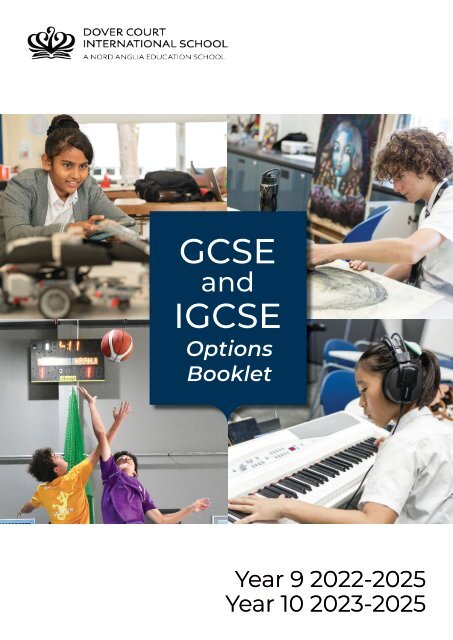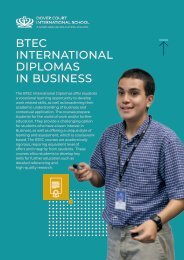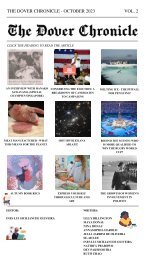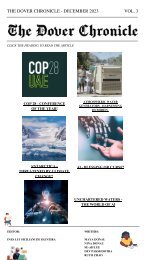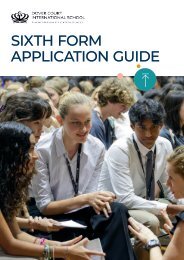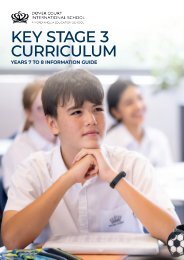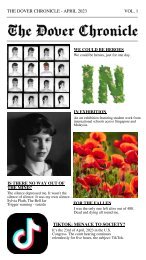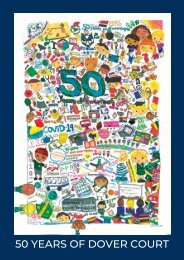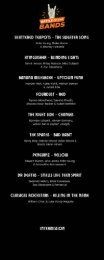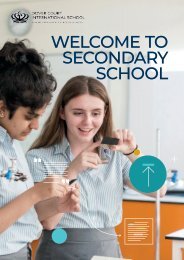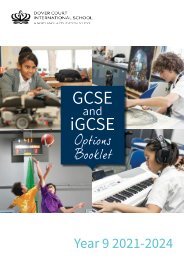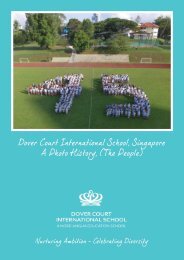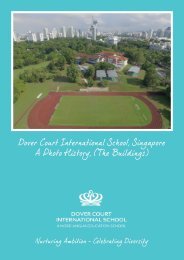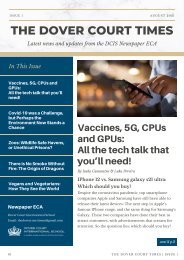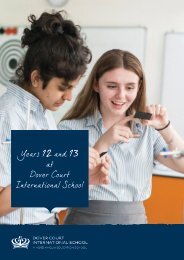IGCSE Options Booklet 2022-2025
IGCSE Options Booklet 2022-2025 update 1st March 2022
IGCSE Options Booklet 2022-2025 update 1st March 2022
Create successful ePaper yourself
Turn your PDF publications into a flip-book with our unique Google optimized e-Paper software.
GCSE<br />
and<br />
<strong>IGCSE</strong><br />
<strong>Options</strong><br />
<strong>Booklet</strong><br />
Year 9 <strong>2022</strong>-<strong>2025</strong><br />
Year 10 2023-<strong>2025</strong>
Welcome to Our School<br />
WELCOME<br />
Dear DCIS Students and<br />
Parents,<br />
Welcome to the <strong>Options</strong><br />
<strong>Booklet</strong> for the <strong>2022</strong> courses.<br />
This booklet outlines the<br />
range of courses which<br />
will be available to you as<br />
you move onto the GCSE<br />
programme at Dover Court International School.<br />
It includes information about the list of subjects<br />
from which you can choose. All students will study<br />
a programme of core subjects which comprise<br />
English, Maths and Science. The options being<br />
offered are subject to the availability of staff and<br />
student interest.<br />
This is a very important and exciting stage on<br />
your DCIS journey, as the choices made now will<br />
have an impact on your future opportunities and<br />
prospects. It is important that you engage fully in<br />
the process of choosing the most appropriate and<br />
beneficial courses for you as an individual.<br />
The world which the current generation of young<br />
people face is very different to the one faced by<br />
the generations before you. It is fast changing and<br />
the job market is a global and highly competitive<br />
one. You will need to ensure that you make the<br />
best choices about learning and achieving whilst<br />
at Dover Court. You will need to aim high, believe<br />
in yourself and work hard!<br />
Our job is to support you in this process so that<br />
you perform well in your examinations, are well<br />
prepared for the world of work and are able to<br />
embrace the challenges which you will face,<br />
positively and successfully.<br />
The choice of courses is only the start of this<br />
process. We will be talking to you individually and<br />
urge you to speak to your subject teachers about<br />
your choices and your aspirations.<br />
2<br />
David Burren<br />
Head of Secondary School
THE GCSE AND <strong>IGCSE</strong><br />
GRADING SCALE<br />
The GCSE and <strong>IGCSE</strong> exams and curricula<br />
are now assessed on a numerical grading<br />
system instead of the old A*-G letter system.<br />
Essentially, the value of the previous A*<br />
and A grades will be distributed across the<br />
three top grades, 7-9. The B and C grades<br />
are similarly spread across grades 4-6. A<br />
grade 4 is considered a “standard pass,”<br />
and anything 5 and above is considered a<br />
“strong pass”.<br />
WHO SHOULD<br />
I SPEAK TO?<br />
• Older brothers and sisters<br />
• Parents<br />
• Subject teachers<br />
• Form tutors<br />
• Older students<br />
MAKING THE RIGHT DECISIONS<br />
Things to remember when making your choices:<br />
• It is your decision<br />
• Do not make decisions based on your friends’ choices just<br />
because you want to stay in the same classes<br />
• Speak to someone who has finished the <strong>IGCSE</strong> for advice<br />
You must choose 4 subjects from the<br />
range of options presented in ‘Option<br />
Blocks’. Do not rush your decision but<br />
at the same time, hand your form in on<br />
time as there are maximum class size<br />
limits. You must choose two subjects from<br />
each block - A, B, C and D. The options<br />
blocks are reviewed each year and will be<br />
presented to you on <strong>Options</strong> Evening.<br />
Your choices may affect your future career.<br />
If you already know what you would like to<br />
do when you leave school, ask your tutor<br />
about suitable subject choices or speak<br />
to the Careers and University Guidance<br />
Counsellor.<br />
3
CORE SUBJECTS<br />
<strong>IGCSE</strong> English Language<br />
Course code: Edexcel 4EA1<br />
What will I learn?<br />
Throughout the language course, you will continue to develop your individual writing style through the exploration<br />
of persuasive, argumentative and informative writing. Our coursework component will require you to write both<br />
imaginatively and effectively. We have a range of non-fiction texts which show how masterfully writers craft<br />
language and use structure to achieve their intended effects. We aim to equip our students with the capability to<br />
critically engage with language as discerning readers.<br />
The aims and objectives of English language are to enable students to:<br />
• Read and understand a wide range of poetry, prose and non-fiction texts<br />
• Analyse how writers use language and structure to create their desired effects<br />
• Critically engage with reading and explore different ideas, perspectives and interpretations<br />
• Draw comparisons and make connections between texts<br />
• Control and adapt their writing for a specific purpose and audience with a focus on vocabulary, syntax and<br />
language devices<br />
How is it assessed?<br />
• Non-fiction reading and Transactional writing examination: 2 hours 15 minutes (60%)<br />
• Two coursework components: Imaginative writing and Analytical coursework (40%)<br />
<strong>IGCSE</strong> English Literature<br />
Course code: Edexcel 4ET1<br />
What will I learn?<br />
Throughout the literature course, you will explore a broad range of poetry from different times, places and<br />
perspectives. You will develop the skill of analysing poetry for meaning and compare the different tone, voice and<br />
ideas that the poets wish to present. Your knowledge of reading plays will continue through the exploration of both<br />
modern and contemporary texts. We will focus on essay writing skills to ensure your writing is deeply analytical and<br />
is able to make links to the social, historical and political context of a literary text.<br />
The aims and objectives of English literature are to enable students to:<br />
• Critically engage with texts from a range of time periods<br />
• Develop a close understanding of poetry, modern prose and literary heritage texts<br />
• Analyse how writers use language, form and structure to convey meaning<br />
• Draw comparisons and make connections between texts<br />
• Explore the influence of contextual factors on a text and how this contributes to meaning<br />
How is it assessed?<br />
• Poetry and Modern Prose Examination: 2 hours (60%)<br />
• Two coursework components: Modern Drama and Literary Heritage Texts (40%)<br />
4
<strong>IGCSE</strong> Mathematics (9-1)<br />
Course code: Edexcel 4MA1<br />
What will I learn?<br />
This is our course for our Key Stage 4 mathematics programmes, and allows students to score grades that will map<br />
well into the IB Diploma programme route. It is structured into topics: Number & Algebra, Geometry and Data<br />
Handling, and students will develop a strong foundation of skills in these areas in order to specialize at a later stage<br />
of their mathematical study.<br />
The aims and objectives of <strong>IGCSE</strong> Mathematics are to enable students to:<br />
• Develop their problem-solving skills by translating problems in mathematical or non-mathematical contexts at<br />
both Higher and Foundation tiers<br />
• Develop reasoning skills through exercises such as presenting arguments and proofs, making deductions and<br />
drawing conclusions from mathematical information.<br />
• Develop cognitive processes and strategies such as critical thinking and analysis that will be developed through<br />
the teaching of each topic:<br />
Number & Algebra<br />
Geometry<br />
Data Handling<br />
• Acquire knowledge and understanding of mathematical facts and terminology<br />
• Use their initiative for using mathematical knowledge independently (without guided learning), to further their<br />
own understanding.<br />
• Develop their communication skills to communicate mathematical processes or techniques (verbally or written)<br />
to peers and teachers and answer questions from others<br />
How is it assessed?<br />
100% written examination: No coursework<br />
The <strong>IGCSE</strong> in Mathematics comprises of two externally-assessed examination papers:<br />
• Paper 1 (2 hour assessment) 50%<br />
• Paper 2 (2 hour assessment) 50%<br />
A mixture of different question styles are utilised, starting with procedural at the beginning of each paper and<br />
becoming more problem-solving based towards the end. A scientific calculator may be used in the examinations.<br />
Different Tiers<br />
Foundation<br />
The foundation tier covers less content than the higher tier assessment and is more accessible to those students<br />
who will not continue with mathematics in their further education. Students who are on this tier are advised to<br />
consider options other than the IB Diploma, such as IB courses. Grades accessible in this tier are 1-5.<br />
Higher<br />
The higher tier covers an extensive amount of content and has more difficult questions in the assessments,<br />
especially when considering the problem-solving based questions. This is a good prerequisite for the IB Diploma as<br />
well as A-levels as students are able to access the highest grades, 3-9.<br />
Students will be following either a Higher or Foundation scheme of work from Year 9, depending on their Maths<br />
set, However, our scheme is written to allow for changes of tier when appropriate. Set allocations are monitored and<br />
adapted after each assessment and the final decision of whether a student is entered for Higher or Foundation tier<br />
is not completed until Year 11 after the mock examinations.<br />
5
GCSE Statistics (9-1)<br />
Course code: Edexcel 1ST0<br />
What will I learn?<br />
This is a new additional Mathematics qualification that we offer, giving students a more thorough introduction to<br />
data handling and statistical analysis. There are many areas that overlap with the <strong>IGCSE</strong> Mathematics course, as<br />
well as additional topics to study such as sampling, skew of data and standard deviation. Due to the nature of some<br />
overlapping content with the <strong>IGCSE</strong> Mathematics course, the extra statistical concepts will be taught alongside the<br />
GCSE content for all Pathway 1 learners, rather than as a separate subject.<br />
The main areas of study are:<br />
1. The collection of data<br />
2. Processing, representing and analysing data<br />
3. Probability<br />
The objective of the GCSE Statistics course is to develop statistical fluency and understanding through:<br />
• The use of statistical techniques in a variety of authentic investigations, using real-world data in contexts such<br />
as, populations, climate, sales etc.<br />
• Identifying trends through carrying out appropriate calculations and data visualisation techniques<br />
• Critically evaluating data, calculations and evaluations that would be commonly encountered in their studies<br />
and in everyday life<br />
• Understand ways that data can be organised, processed and presented, including statistical measures to<br />
compare data, understanding the advantages of using technology to automate processing<br />
• Applying appropriate mathematical and statistical formulae, and building on prior knowledge.<br />
The GCSE Statistics course will be excellent preparation for further study of statistics at IBDP (particularly the<br />
‘Applications and Interpretations HL/SL courses) or A Levels, whilst simultaneously better equipping students for the<br />
demands of statistical analysis in other post-16 subject options such as Biology and Psychology.<br />
How is it assessed?<br />
100% written examination: No coursework<br />
The GCSE Statistics comprises of two externally-assessed examination papers:<br />
• Paper 1 (1 hour 30 minutes assessment) 50%<br />
• Paper 2 (1 hour 30 minutes assessment) 50%<br />
All content from the GCSE course can be assessed on either assessment and a scientific calculator should be used<br />
for both exam papers. The papers contain short response, medium response and extended response questions.<br />
Different Tiers<br />
Foundation<br />
The foundation tier covers less content than the higher tier assessment and is more accessible to those students<br />
who will not continue with mathematics in their further education or are currently studying the <strong>IGCSE</strong> Mathematics<br />
Foundation course. Grades accessible in this tier are 1-5.<br />
Higher<br />
The higher tier covers an extensive amount of content and has more difficult questions in the assessments,<br />
especially when considering the problem-solving based questions. This is a good prerequisite for the IB Diploma as<br />
well as A-levels as students are able to access the highest grades, 3-9.<br />
As this is an additional qualification and the topics are integrated within our KS4 scheme of work, entry into<br />
the GCSE Statisitics examination will be decided in Year 11, with some students focusing solely on the <strong>IGCSE</strong><br />
Mathematics course if necessary. Students taking Higher <strong>IGCSE</strong> Mathematics may be entered for Foundation GCSE<br />
Statistics and vice versa, depending on aptitude.<br />
6
Entry Level Certificate in Mathematics (3-1)<br />
Course code: AQA 5930<br />
What will I learn?<br />
The Entry Level Certificate in Mathematics covers the<br />
majority of functional mathematics required for day to<br />
day activities. It is predominantly targeted at learners on<br />
our Pathway 2 learning programme or for students who<br />
are demonstrating that they will not be able to achieve a<br />
grade on the <strong>IGCSE</strong> course.<br />
The aims and objectives of Entry Level Certificate in<br />
Mathematics are to enable students to develop:<br />
• A willingness and ability to work independently and<br />
co-operatively<br />
• An ability to understand mathematical ideas and to<br />
communicate them in a variety of modes<br />
• An appreciation of the ways in which mathematics is<br />
used<br />
• The knowledge, skills and understanding needed to<br />
apply a range of mathematical concepts to situations<br />
which may arise in their own lives<br />
• An ability to use mathematics across the curriculum<br />
• A firm foundation for appropriate further study<br />
How is it assessed?<br />
100% written assessment: There is an option to use<br />
classwork as supporting evidence for up to 4 components<br />
in lieu of exam assessment.<br />
<strong>IGCSE</strong> Science (Double Award) (9-1)<br />
Course code: Edexcel 4SD0<br />
The AQA entry level certificate comprises of eight<br />
externally set papers that allow for 3 sittings in total:<br />
• Component 1: properties of number - 30 marks<br />
• Component 2: the four operations - 30 marks<br />
• Component 3: ratio - 30 marks<br />
• Component 4: money - 30 marks<br />
• Component 5: the calendar and time - 30 marks<br />
• Component 6: measures - 30 marks<br />
• Component 7: geometry - 30 marks<br />
• Component 8: statistics - 30 marks<br />
A mixture of different question styles are utilised, including<br />
multiple-choice questions, short-answer questions and<br />
calculations. A calculator may be used in the examinations.<br />
There is no set time for when each assessment is<br />
completed or how long the student takes to complete<br />
each test. The assessments can be sat in normal<br />
classroom conditions but other examination procedures<br />
apply, regarding invigilation and safeguards against<br />
communication between students. Students have the<br />
opportunity to retake the assessment twice. However, no<br />
feedback or guidance on their original answers is provided.<br />
There must be a gap of at least two weeks before they can<br />
retake the assessments.<br />
What will I learn?<br />
This is the highest key stage four science programme<br />
offered at DCIS, which has the rigour and demand<br />
necessary for our top students wishing to progress onto<br />
the IB Diploma Programme, Courses, or key stage five<br />
equivalent. All learners will be taught Biology, Chemistry<br />
and Physics and a grade will be awarded based on the<br />
average performance over all three disciplines. Please<br />
note, we no longer offer the <strong>IGCSE</strong> Science (Triple Award)<br />
option.<br />
The aims and objectives of <strong>IGCSE</strong> Science (Double Award)<br />
are to enable students to:<br />
• Learn about unifying patterns and themes in science<br />
and use them in new and changing situations<br />
• Acquire knowledge and understanding of scientific<br />
facts, terminology, concepts, principles and practical<br />
techniques<br />
• Apply the principles and concepts of science,<br />
including those related to the applications of science,<br />
to different contexts<br />
• Evaluate scientific information, making judgements<br />
on the basis of this information<br />
• Appreciate the practical nature of science, developing<br />
experimental and investigative skills based on correct<br />
and safe laboratory techniques<br />
• Analyse, interpret and evaluate data and experimental<br />
methods, drawing conclusions that are consistent<br />
with evidence from experimental activities and<br />
suggesting possible improvements and further<br />
investigations<br />
• Recognise the importance of accurate experimental<br />
work and reporting scientific methods in science<br />
• Select, organise and present relevant information<br />
clearly and logically using appropriate vocabulary,<br />
definitions and conventions<br />
• Develop a logical approach to problem solving in a<br />
wider context<br />
• Select and apply appropriate areas of mathematics<br />
relevant to science as set out under each topic<br />
preparing for more advanced courses in science and<br />
for other courses that require knowledge of science<br />
How is it assessed?<br />
100% written examination: No practical coursework<br />
The <strong>IGCSE</strong> in Science (Double Award) comprises three<br />
externally-assessed examination papers:<br />
• Biology Paper 1 (2 hour assessment) 33.3%<br />
• Chemistry Paper 1 (2 hour assessment) 33.3%<br />
• Physics Paper 1 (2 hour assessment) 33.3%<br />
A mixture of different question styles are utilised, including<br />
multiple-choice questions, short-answer questions,<br />
calculations and extended open-response questions. A<br />
calculator may be used in the examinations.<br />
Students are awarded two <strong>IGCSE</strong> Levels ranging from<br />
9-1. This qualification is worth two <strong>IGCSE</strong>s. Students are<br />
awarded grades in the form 7-7. This means two grade 7s<br />
were scored. Intermediate grades may also be awarded.<br />
For example a 8-7 would mean a student was scoring<br />
mainly a 7, however was also achieving some grade 8s<br />
in their assessments. A student can only have these<br />
two consecutive grades. A 7-5 would not be possible<br />
as the two grades must be consecutive.This grade will<br />
be calculated by average performance across all three<br />
scientific specialisms. The student’s science teacher will<br />
recommend placement on this course based on in-class<br />
assessment.<br />
7
GCSE Combined Science (Foundation) (5-1)<br />
Course code: Edexcel 1SC0<br />
What will I learn?<br />
This programme covers a similar specification to GCSE in Science (Double Award) specification, however the GCSE<br />
Foundation Combined Science is more accessible for those students aiming for grade 4 or grade 5. This qualification<br />
is worth two GCSEs.<br />
The aims and objectives of GCSE Combined Science (Foundation) (5-1) are to enable students to:<br />
• Learn about unifying patterns and themes in science and use them in new and changing situations<br />
• Acquire knowledge and understanding of scientific facts, terminology, concepts, principles and practical<br />
techniques<br />
• Apply the principles and concepts of science, including those related to the applications of science, to different<br />
contexts<br />
• Evaluate scientific information, making judgements on the basis of this information<br />
• Appreciate the practical nature of science, developing experimental and investigative skills based on correct and<br />
safe laboratory techniques<br />
• Analyse, interpret and evaluate data and experimental methods, drawing conclusions that are consistent with<br />
evidence from experimental activities<br />
• Recognise the importance of accurate experimental work and reporting as scientific methods in science<br />
• Select, organise and present relevant information clearly and logically using appropriate vocabulary, definitions<br />
and conventions<br />
• Develop a logical approach to problem solving in a wider context<br />
• Select and apply appropriate areas of mathematics relevant to science as set out under each topic<br />
How is it assessed?<br />
100% written examination: No practical coursework<br />
The GCSE Combined Science comprises of six externally-assessed examination papers:<br />
• Biology Papers 1 (1 hour 10 minutes assessment) 16.6%<br />
• Biology Papers 2 (1 hour 10 minutes assessment) 16.6%<br />
• Chemistry Papers 1 (1 hour 10 minutes assessment) 16.6%<br />
• Chemistry Papers 2 (1 hour 10 minutes assessment) 16.6%<br />
• Physics Papers 1 (1 hour 10 minutes assessment) 16.6%<br />
• Physics Papers 2 (1 hour 10 minutes assessment) 16.6%<br />
Each paper will assess unique topics which are known to students before the exam. A mixture of different question<br />
styles are utilised, including multiple-choice questions, short-answer questions, calculations and extended openresponse<br />
questions. A calculator may be used in the examinations.<br />
Students are awarded two GCSE Level ranging from 9-1, averaged across all six exam papers.<br />
The student’s science teacher will recommend placement on this course based on in-class assessment.<br />
8
Entry Level Certificate in Science (3-1)<br />
Course code: NSC0<br />
What will I learn?<br />
The Entry Level Certificate in Science covers the majority of the key stage four programme of study in science. It is<br />
predominantly targeted at learners on our pathway 2 learning programme or those who do not wish to not pursue<br />
the sciences into key stage five.<br />
The aims and objectives of Entry Level Certificate in Science are to enable students to:<br />
Acquire a body of basic scientific knowledge and an understanding of some important scientific ideas consistent<br />
With the programme of study<br />
Develop basic experimental and investigative abilities<br />
Develop a basic understanding of some of the important technological and environmental applications of science<br />
and the economic, ethical and social implications consistent with the programme of study<br />
How is it assessed?<br />
100% written assessment: No practical coursework<br />
The Entry Level Certificate in Science comprises six internally-assessed assessment papers:<br />
• Biology Paper 1 16.7% (25 marks)<br />
• Biology Paper 2 16.7% (25 marks)<br />
• Chemistry Paper 1 16.7% (25 marks)<br />
• Chemistry Paper 2 16.7% (25 marks)<br />
• Physics Paper 1 16.7% (25 marks)<br />
• Physics Paper 2 16.7% (25 marks)<br />
A mixture of different question styles are utilised, including multiple-choice questions, short-answer questions and<br />
calculations. A calculator may be used in the examinations.<br />
There is no set time for when each assessment is completed or how long the student takes to complete each test.<br />
The assessments can be sat in normal classroom conditions but other examination procedures apply, regarding<br />
invigilation and safeguards against communication between students. Students have the opportunity to retake the<br />
assessment as many times as they like. However, no feedback or guidance on their original answers is provided. There<br />
must be a gap of at least two weeks before they can retake the assessments.<br />
The student’s total mark out of 150 then establishes the level they have achieved as shown in the table below:<br />
Level<br />
Minimum total marks required<br />
Fail Below 30<br />
Entry Level 1 30/150<br />
Entry Level 2 65/150<br />
Entry Level 3 100/150<br />
The student’s science teacher will recommend placement on this course based on in-class assessment.<br />
9
OPTION SUBJECTS - HUMANITIES<br />
<strong>IGCSE</strong> Geography<br />
Course Code: Edexcel 4GE1<br />
What will I learn?<br />
<strong>IGCSE</strong> Geography gives you an opportunity to develop<br />
an understanding of the world around you and the<br />
interconnections between people and the environments<br />
we inhabit. We will develop understanding of both<br />
human and physical processes that shape the world<br />
around us, including the urban and coastal environments<br />
of Singapore.<br />
The course develops skills useful for the IB Diploma<br />
programme for Geography and other natural sciences,<br />
and enables students to:<br />
• Explore a range of viewpoints of global problems<br />
• Develop data collection techniques<br />
• Increase awareness of the causes and impacts of<br />
global events and issues<br />
• Develop fieldwork skills.<br />
How is it assessed?<br />
The course is accessed through two examination papers<br />
Paper 1:<br />
• Physical Geography and Fieldwork (40% of final<br />
grade)<br />
• Two topics (Coasts and Hazards) and a fieldwork<br />
question (Coasts)<br />
Paper 2:<br />
• Human Geography, Contemporary Geographical<br />
Issue and Fieldwork (60% of final grade)<br />
• Three topics (Economic Activity & Energy, Urban<br />
Environments and Development & Human Welfare).<br />
Why should I choose this course?<br />
Geography will help you develop a wide range of<br />
transferable skills needed in higher education courses<br />
and in many careers. As a subject, it gives you the chance<br />
to analyse patterns you see in your day-to-day life and<br />
broaden your interpretation and understanding of how<br />
these patterns build unique places.<br />
You will analyse differences between people and locations<br />
at different levels of development and discuss how the<br />
human and physical world interact. You will develop your<br />
literacy through essay and report writing, make practical<br />
use of your numeracy skills while constructing graphs<br />
and enhance your analytical skills by looking at patterns in<br />
data. Geography is seen as a good qualification by many<br />
employers due to this wide range of skill development.<br />
<strong>IGCSE</strong> History<br />
Course Code: Edexcel 4HI0<br />
Students who enjoy debating and have an interest in<br />
world politics will find this course rewarding. People who<br />
have studied History at university often go on to become<br />
lawyers, accountants, journalists, teachers, civil servants,<br />
academics, bankers and librarians.<br />
What will I learn?<br />
<strong>IGCSE</strong> History gives students opportunities to:<br />
• Acquire knowledge and understanding of selected<br />
periods and aspects of history, explore significance<br />
of historical events, people, changes and issues<br />
• Use historical sources critically in their context,<br />
recording significant information and reaching<br />
conclusions<br />
• Organise and communicate their knowledge and<br />
understanding of history<br />
• Draw conclusions and make historical judgments<br />
How is it assessed?<br />
The final marks are assessed over two papers:<br />
Paper 1: Two topics of study (50%)<br />
• Development of dictatorship: Germany, 1918-1945<br />
• A world divided: superpower relations, 1943–72<br />
Paper 2: Two topics of study (50%)<br />
• Origins and course of the First World War, 1905-1918<br />
• Conflict, crisis and change: China, c1911-c1989<br />
Why should I choose this course?<br />
The study of History provides a unique opportunity to<br />
understand how conflict, extremism and individuals<br />
shaped the world in which we live. Many skills are<br />
developed in the study of history which are not only<br />
useful for school but for life beyond such as critical<br />
reasoning, analytic skills and interpretation. Students<br />
are encouraged to develop an individual viewpoint and<br />
support this through the use of historical sources and<br />
their own knowledge.<br />
History is still widely seen as an academic ‘gold standard’<br />
by universities and employers. An <strong>IGCSE</strong> History<br />
qualification is evidence that an individual can assimilate<br />
information and make judgements about it; weigh up<br />
different points of view; and express themselves in an<br />
articulate and coherent way. These are all intellectual<br />
qualities which are highly prized in today’s job market.<br />
10
<strong>IGCSE</strong> Global Citizenship<br />
Course Code: Edexcel 4GL1<br />
What will I learn?<br />
The curriculum is engaging, relevant and widens students’ knowledge of contemporary issues. It encourages them<br />
to reflect on what makes them a ‘global citizen’, and how their learning will develop their skills and knowledge within<br />
their local and national communities. Through the content studied and assessment, students will respond to issues<br />
and take part in the community project, which allows them to ‘engage’ with a global society. This will enable them<br />
to take greater ownership and responsibility of the community activity to demonstrate active citizenship – improving<br />
others’ societies as well as their own. Throughout the exploration of citizenship concepts, students are encouraged to<br />
learn more about their own values and beliefs, using a contemporary range of local, national and global case studies.<br />
Content<br />
The course is based around four central themes:<br />
• Politics and Governance<br />
• Economic Development and the Environment<br />
• Culture and Community<br />
• Technology<br />
• Active Learning<br />
As part of the course, students are required to plan and undertake a project which has a positive impact on the local<br />
community. This is a great way to prepare students for the IB Diploma core element of CAS (Creativity, Activity and<br />
Service). This component is assessed through the written exam.<br />
How is it assessed?<br />
100% external assessment - one exam paper which is 2 hours 30 minutes.<br />
Why should I choose this course?<br />
Students with an interest across Humanities subjects (Geography, History, Religious Studies and Psychology) would<br />
also enjoy Global Citizenship.<br />
This subject encourages you to develop the knowledge, skills and values you need to engage with the world - with<br />
the belief that we can all make a difference. It is a framework for learning, reaching beyond school to the wider<br />
community.<br />
Global Citizenship helps you to:<br />
• Build your own understanding of world events.<br />
• Think about your values and what’s important to you.<br />
• Take learning into the real world.<br />
• Challenge ignorance and intolerance.<br />
• Get involved in your local, national and global communities.<br />
• Develop an argument and voice your opinions.<br />
• See that you have power to act and influence the world around you.<br />
Students who choose Global Citizenship might go on to choose Humanities based degrees or careers involving<br />
people, politics or society.<br />
11
<strong>IGCSE</strong> Religious Studies<br />
Course Code: Edexcel 4RS1<br />
What will I learn?<br />
Religious Studies encourages:<br />
• Respect for self and others<br />
• Contribution to an understanding of history and culture<br />
• Our understanding of global affairs<br />
• Personal well-being and happiness<br />
• Safeguarding of ethical standards in public life<br />
• Social and community cohesion<br />
Students develop the ability to:<br />
• Analyse and evaluate content through realistic and<br />
contextualised tasks<br />
• Construct well-argued and well-informed structured<br />
written arguments<br />
• Engage with questions of belief, value, purpose and<br />
truth and their influence on human life<br />
• Develop their own values, beliefs and attitudes<br />
How is it assessed?<br />
The final marks are assessed over two papers:<br />
Paper 1: Two topics of study (60%)<br />
This paper assesses knowledge and understanding of four<br />
key topic areas from a chosen religion:<br />
• Section 1: The Universe, Creation and the Place of<br />
Human Beings<br />
• Section 2: Life and Death<br />
• Section 3: Peace and Conflict<br />
• Section 4: Rights, Equality and Social Justice<br />
GCSE Psychology<br />
Paper 2: Two topics of study (40%)<br />
This paper assesses knowledge and understanding of three<br />
key topic areas from a chosen religion:<br />
• Section 1: Origins and their Impact on the Community<br />
• Section 2: Celebration and Pilgrimage<br />
• Section 3: Worship and Practice<br />
Why should I choose this course?<br />
Religious Studies has never been more relevant, engaging<br />
or challenging as religion & religious issues are such a<br />
large part of today’s society. The recent events that we<br />
see in the news are just a reminder of the dangers of<br />
religious extremism and how religious education can<br />
play a vital role in addressing these matters. For you to be<br />
able to understand our constantly changing world, you<br />
need to be able to interpret religious issues & evaluate<br />
their significance. Religious Studies gives you valuable<br />
insights into the diverse beliefs & opinions held by people<br />
today. It helps with your own personal development &<br />
supports an understanding of the spiritual, moral, social &<br />
cultural questions that surface again & again in your lives.<br />
In tackling difficult questions it provides you with insight<br />
that can work to challenge stereotypes, promote cohesion,<br />
and tackle extremism. Religious Studies does important<br />
work encouraging young people to value themselves & the<br />
communities within which they live.<br />
The study of Religious Studies helps to build important<br />
transferable skills such as; Reasoning, intellectual<br />
interest and curiosity and a high standard of literacy and<br />
communication. It is highly respected by universities and<br />
colleges and students use the skills and qualification to go<br />
on to professional careers.<br />
Course Code: Edexcel 1PSO<br />
What will I learn?<br />
The aims and objectives of this qualification are to enable<br />
students to:<br />
• Use specialist vocabulary, psychological concepts,<br />
terminology and convention to engage in the process<br />
of psychological enquiry<br />
• Acquire knowledge and understanding of psychology,<br />
developing an understanding of self and others, and<br />
how psychological understanding can help to explain<br />
everyday social phenomena<br />
• Understand how psychological research is conducted,<br />
including the role of scientific method and data analysis<br />
• Present information, develop arguments and draw<br />
conclusions through a critical approach to psychological<br />
evidence, developing as reflective thinkers<br />
• Develop an understanding of the relationship between<br />
psychology and personal, moral, social and cultural<br />
issues, and develop an understanding of ethical issues<br />
in psychology<br />
• Develop an understanding of psychological issues, the<br />
contribution of psychology to individual, social and<br />
cultural diversity, and how psychology contributes to<br />
society<br />
How is it assessed?<br />
100% external assessment through examination. There are<br />
2 exam papers:<br />
• Paper 1 - 1 hour and 45 minutes<br />
• Paper 2 - 1 hour and 20 minutes.<br />
12<br />
There are a range of questions from multiple choice to<br />
essays.<br />
Content<br />
All students will study the following six core topics:<br />
• Development – How did you develop?<br />
• Memory – How does your memory work?<br />
• Psychological problems – How would psychological<br />
problems affect you?<br />
• The brain and neuropsychology – How does your brain<br />
affect you?<br />
• Social influence – How do others affect you?<br />
Research methods<br />
Students will also study an additional topic from options<br />
which could include; criminal psychology, perception, sleep<br />
and dreaming and language communication.<br />
Why should I choose this course?<br />
Students who enjoy Humanities based subjects may also<br />
enjoy psychology. It is an academic subject which requires<br />
a high level of literacy and the ability to use case studies<br />
and data to support reasoning. Students who choose<br />
Psychology may go on to choose Psychology for IB level<br />
study and degree, or other humanities based courses and<br />
careers.
ENTERPRISE<br />
<strong>IGCSE</strong> Business<br />
Course Code: Edexcel 4BS1<br />
What will I learn?<br />
Business is the study of decision-making within an organisation. On the course students will discover the different<br />
factors that influence both small and large businesses. Students will study business functions, management processes<br />
and decision-making. Students will examine how business decisions are influenced by internal and external factors,<br />
and how these decisions impact upon its stakeholders. Business also explores how individuals and groups interact<br />
within an organisation, how they may be successfully managed and how they can ethically optimise the use of<br />
resources in a world with increasing scarcity and concern for sustainability.<br />
Key subject aims<br />
Business Studies requires students to:<br />
• Develop an interest in and enthusiasm for the study of business<br />
• Develop an understanding of business concepts, terminology, objectives and the integrated nature of business<br />
activities<br />
• Understand how the main types of business are organised, financed and operated<br />
• Develop and apply knowledge, understanding and skills to contemporary business issues in a wide range of<br />
businesses from small enterprises to large multinationals and businesses operating in local, national and global<br />
contexts<br />
• Develop critical-thinking and enquiry skills to distinguish between facts and opinion, calculating, interpreting and<br />
evaluating business data, to help build arguments and make informed judgements<br />
• Develop an understanding of the dynamics of business activity and the related considerations of ethics and<br />
sustainability for global businesses<br />
Units of Study<br />
• Business activity and influences on business<br />
• People in business<br />
• Business Finance<br />
• Marketing<br />
• Business Operations<br />
How is it assessed?<br />
Two examinations of 1 hour 30 minutes each, consisting of four compulsory questions. Exam questions are based on<br />
real-life business scenario case studies.<br />
• Paper 1 scenarios are based on a small business. (50%)<br />
• Paper 2 scenarios are based on a large business. (50%)<br />
The sub-questions are a mixture of multiple-choice, short-answer, data-response and open-ended questions.<br />
Both papers will draw on topics taken from the whole of the subject content. Students are tested on knowledge,<br />
understanding, analytical and evaluation skills.<br />
Why should I choose this course?<br />
Business is an academic subject which requires a high level of literacy and the ability to evaluate information<br />
presented in case studies to support reasoned judgements. Students who choose Business may go on to choose<br />
Business Management for IB level study or other related courses and careers.<br />
Through the study of topics such as business organisation, human resource management and finance, the course aims<br />
to develop transferable skills relevant to today’s students. These include the ability to: think critically; make ethically<br />
sound and well-informed decisions; appreciate the pace, nature and significance of change; think strategically; and<br />
undertake long term planning, analysis and evaluation.<br />
13
<strong>IGCSE</strong> Computer Science<br />
Course Code: Edexcel 4CP0<br />
What will I learn?<br />
The study of computer science differs from ICT, as the most important aspect of computer science is problem<br />
solving, an essential skill for life. Students study the design, development and analysis of software and hardware<br />
used to solve problems in a variety of business, scientific and social contexts. Computer science synthesizes different<br />
subject disciplines, such as mathematics to support the abstract nature of the problems. Because computers solve<br />
problems to serve people, there is a significant human side to computer science as well.<br />
Alongside computational problem solving, you will investigate the impact of digital technology on the individual<br />
and the wider society with specific focus on cyber security, artificial intelligence, as well as legal and moral issues.<br />
Key Subject Aims<br />
Computer Science requires students to:<br />
• Understand and apply the fundamental principles and concepts of Computer Science, including abstraction,<br />
decomposition, logic, algorithms and data representation<br />
• Analyse problems in computational terms through practical experience of solving such problems, including<br />
designing, writing and debugging programs<br />
• Think creatively, innovatively, analytically, logically and critically<br />
• Understand the components that make up digital systems, and how they communicate with one another and<br />
with other systems<br />
• Understand the impacts of digital technology to the individual and to wider society<br />
• Apply mathematical skills relevant to computer science<br />
How is it assessed?<br />
The course is accessed over two papers:<br />
Paper 1:<br />
Principles of Computer Science<br />
Format: Written Paper<br />
Duration: 2hrs<br />
Weighting: 50%<br />
Content coverage:<br />
• Uses of algorithms and standard algorithms (search and sort)<br />
• Data representation<br />
• Hardware and software<br />
• Networking, cyber security and the internet<br />
• Technological innovations, legal, moral and ethical impact of technology<br />
Paper 2:<br />
Application of Computational Thinking<br />
Format: Practical Paper<br />
Duration: 3hrs<br />
Weighting: 50%<br />
Content coverage:<br />
• Designing, developing and interpreting algorithms<br />
• Implementing a solution using a high-level language – Python<br />
• Boolean logic; constructing truth tables and logic statements<br />
Why should I choose this course?<br />
This course has been designed to equip our 21st century young people with the necessary knowledge, skills and<br />
understanding to thrive in this digital age. The knowledge and skills acquired from the study of Computer Science<br />
will complement STEAM subjects, where the tasks and situations progressively need the aid of computer systems to<br />
solve problems.<br />
14
BTEC Level 1 Introductory in Business<br />
Qualification: Pearson Edexcel BTEC Introductory<br />
Certificate in Business<br />
Course Code: 601/8573/9<br />
What will I learn?<br />
The development of transferable and sector skills is<br />
the main focus of learning. We intend for every learner<br />
to have the opportunity to develop key transferable<br />
skills through both core and sector units. This will help<br />
learners to appreciate how the transferable skills they<br />
develop in their core units can be contextualised within<br />
the business sector. On completion of their course,<br />
learners will have developed a set of transferable and<br />
sector skills that will benefit them whatever their<br />
chosen progression route. The transferable skills<br />
covered in the units are: Communication; Working with<br />
others: Problem solving; Managing information; Self<br />
management and development.<br />
Key Subject Aims<br />
BTEC Business Level 1 requires students to:<br />
• Develop key techniques to help organise their work<br />
and priorities and manage their time effectively<br />
• Explore the skills and behaviours needed to meet<br />
personal progression goals<br />
• Develop the skills to present a business idea to an<br />
audience<br />
• Find out about different businesses in your area and<br />
how they meet customer needs<br />
• Create a brand logo and strapline for a product for a<br />
target market<br />
How is it assessed?<br />
All units in this specification are internally assessed and<br />
externally verified.<br />
Students complete assignments or submit evidence<br />
towards the unit criteria. There are no examined units.<br />
Core Units: Learners must complete both units<br />
• A1 Being Organised<br />
• A2 Developing a Personal Progression Plan<br />
Sector Units: Learners must complete three units<br />
• Finding out about businesses in your area<br />
• Pitching a new business idea<br />
• Branding a product<br />
Other units may be studied at the discretion of the<br />
teacher.<br />
Why should I choose this course?<br />
This course provides opportunities to develop key life<br />
skills as well as sector specific skills. Due to the nature of<br />
the assessment method and the fact that this is a Level<br />
1 qualification, students are able to access the learning<br />
more successfully than an <strong>IGCSE</strong> Level 2 qualification.<br />
This course is designed to support learners to develop<br />
work-related skills.<br />
BTEC International Level 2 in IT<br />
Qualification: Pearson BTEC International Level 2<br />
Extended Certificate in Information Technology<br />
Course Code: 19337<br />
The study of IT differs from computer science, with the<br />
focus on applying information technology to meet end<br />
user’s needs, particularly in a business context. The<br />
increasing use of technology in all aspects of society<br />
makes confident, creative and productive use of ICT an<br />
essential skill for life. ICT capability encompasses not<br />
only the mastery of technical skills and techniques, but<br />
also the understanding to apply these skills purposefully,<br />
safely and responsibly in learning.<br />
Key Subject Aims<br />
• Learners use IT tools to communicate and exchange<br />
information safely, securely and effectively with<br />
different audiences. Learners will also consider<br />
the impacts of IT on individuals, communities and<br />
society.<br />
• Learners understand the purpose of different<br />
document types, know the software available<br />
to produce them and enable them to produce<br />
and review appropriate documents for different<br />
audiences.<br />
• Develop learners’ knowledge of the available job<br />
roles involving professional IT and the characteristics<br />
employers demand in the IT industry.<br />
• Develop learners’ knowledge of the purposes of<br />
interactive media and how interactive media products<br />
are created. Learners will achieve this through a<br />
study of interactive media products, planning and<br />
producing an interactive media presentation, and<br />
reflecting on their work.<br />
How is it assessed?<br />
All units in this specification are internally assessed and<br />
externally verified.<br />
Students complete assignments or submit evidence<br />
towards the unit criteria. There are no examined units.<br />
Core Units<br />
• Unit 1 - Communicating in the IT Industry<br />
• Unit 2 - Working in the IT Industry<br />
Optional Units<br />
• Unit 29 - Presenting Information using IT<br />
• Unit 31 - Interactive Multimedia Production<br />
Why should I choose this course?<br />
The qualification has been designed to give learners<br />
the opportunity to enter employment in the IT sector<br />
or to progress to higher vocational IT qualifications. For<br />
learners who wish to continue their studies at DCIS, this<br />
qualification will enable the learner to access the BTEC<br />
Level 3 International Diploma in Business.<br />
15
ASDAN CoPE (Certificate of Personal Effectiveness)<br />
Years 9 and 10<br />
Students who are interested to develop a range of personal, key and employability skills, to broaden their experience<br />
and manage their learning in a variety of real life contexts by understanding, taking responsibility for and learning<br />
from rich activities, rather than simply to experience them.<br />
What will I learn?<br />
Completion of the qualification involves three main strands:<br />
• Taking responsibility for planning, organising and carrying out a number of activities, or challenges, and evidencing<br />
this work in a portfolio<br />
• Developing and evidencing the skills represented by the CoPE assessment units<br />
• Completing skill-specific evidence records using ASDAN documentation<br />
ASDAN CoPE gives students opportunities to explore and develop the following skills:<br />
• Introduction to Working with Others (in a team)<br />
• Introduction to Improving own Learning and Performance<br />
• Introduction to Problem Solving<br />
• Planning and Carrying out a Piece of Research<br />
• Communicating Through Discussion (in a group)<br />
• Planning and Giving an Oral Presentation<br />
How is it assessed?<br />
Students will be assessed by presenting an organised portfolio that includes the evidence for each unit chosen.<br />
Why should I choose this course?<br />
ASDAN CoPE quantifies and formalises students’ preparedness to progress into further or higher education,<br />
employment, or vocational training and apprenticeships.<br />
ASDAN Employability - Years 10 and 11<br />
Students who are interested to develop the skills needed to become successful employees.<br />
What will I learn?<br />
The qualification is credit-based and candidates must choose a combination of units from those listed below:<br />
• Career exploration<br />
• Applying for a job<br />
• Learning through work experience<br />
• Enterprise skills<br />
• Meetings in the workplace<br />
• Opportunities for learning and work<br />
• Managing personal finance as an employee<br />
• Overcoming barriers to work<br />
• Using advice and guidance<br />
• Using ICT in the workplace<br />
How is it assessed?<br />
Students will be assessed by presenting an organised portfolio that includes the evidence for each unit chosen.<br />
Why should I choose this course?<br />
ASDAN Employability supports students in overcoming barriers to entering work. It is primarily intended for young<br />
people who are not yet ready for employment but for whom a job is a realistic aim within a reasonable timescale.<br />
16
EXPRESSIVE ARTS<br />
GCSE Music<br />
Course Code: Edexcel 1MU0<br />
What will I learn?<br />
Edexcel GCSE Music is a broad and engaging course designed to develop and extend the teaching of the three main<br />
skills students will have already experienced in Key Stage 3: performing, composing, and listening. Through a wide<br />
range of tasks, students will learn about many aspects and styles of music. Taking this course prepares students to<br />
continue their studies into the new IB DP Music. Music is an excellent Arts subject for learning the disciplines and<br />
skills such as critical, analytical thinking and creativity favoured by modern employers and universities.<br />
Areas of Study<br />
The areas of study allow the use of music technology in performance and as a compositional tool, providing a solid<br />
foundation for Music at IB level.<br />
Areas of study include:<br />
• Music Technology<br />
• Instrumental Music<br />
• Vocal Music<br />
• Music for Stage and Screen<br />
• Fusions<br />
In addition to these areas of study, students develop compositional skills, performance skills and/or music production<br />
skills.<br />
Pre-Requisites<br />
Students should show a genuine interest in performing, composing and listening to music. Previous experience<br />
learning an instrument is advised but not necessarily required, although we would expect that once they have<br />
opted to take the subject, this would become an area of focus for them in Year 9. Students will be expected to either<br />
participate in and potentially lead an extra-curriciular music activity/club to support their GCSE studies.<br />
The course is designed in such a way that students of all abilities can access it and find success. Students who already<br />
play an instrument and have some previous musical experiences are at an advantage, but any students with a genuine<br />
interest and passion for music will have the potential to succeed.. An ability to read music at the start of the course,<br />
is helpful but not essential. It is an expectation that Music students take advantage of the many ECA opportunities<br />
provided by the Music department. Music ECAs greatly enhance students’ musical skills beyond the classroom and<br />
give a greater chance of success at GCSE.<br />
How is it assessed?<br />
The course is divided into three components:<br />
• Performance (30%)<br />
• Composition (30%)<br />
• Listening and Appraising (40%)<br />
Why should I choose this course?<br />
Whether your child is a producer, composer or performer, the GCSE will nurture their interests, encourage aspirations<br />
and foster creativity.<br />
17
GCSE Drama<br />
Course Code: Edexcel 1DR0<br />
What will I learn?<br />
GCSE Drama is an exciting course that teaches students to recognise and understand the roles and responsibilities<br />
of performers, designers and directors. Students develop their creativity by learning how to devise their own<br />
performances, taking responsibility for the entire production, from scriptwriting to lighting and sound design.<br />
Opportunities to interpret a script from ‘page to stage’ will focus on how to illicit response and create meaning for<br />
an audience. Experimentation with staging choices, performance skills and technical elements of theatre will allow<br />
students to demonstrate their knowledge of context and drama theory. Students will also be required to watch<br />
professional theatre and analyse the creative decisions of the production team, which will develop their understanding<br />
of successful aspects of Drama.<br />
How is it assessed?<br />
GCSE Drama consists of two non-examination assessment components (coursework) that are moderated by the<br />
exam board and one externally examined paper (written exam).<br />
Content<br />
Component 1:<br />
Devising (40% of the qualification)<br />
Working in a group as a performer to create and develop an original piece of drama in response to a stimulus. The<br />
performance of the devised work is worth 15 marks. The analysis and evaluation of both development and performance<br />
will be recorded in a portfolio worth 45 marks.<br />
Component 2:<br />
Performance from Text (20% of the qualification)<br />
Exploration as a performer of two key extracts from a performance text. Creation of a performance of the two key<br />
extracts and presentation to a visiting examiner.<br />
Component 3:<br />
Theatre Makers in Practice (40% of the qualification) Written examination 1hour 30 minutes.<br />
• Section A (Bringing Texts to life) - Demonstration of knowledge and understanding of how a performance text<br />
can be developed and performed.<br />
• Section B (Live theatre evaluation) - Evaluation and analysis of a live theatre performance seen during the course.<br />
Students must participate in group performances and activities (both in and out of class) and attend a professional<br />
production. Drama demands a high degree of motivation, self-discipline and active involvement. Anyone considering<br />
an occupation that directly involves communicating with other people should seriously consider Drama as a GCSE<br />
option. There is an expectation that students studying GCSE Drama will take part in school productions.<br />
Why should I choose this course?<br />
This programme will help students to develop a plethora of transferable skills such as communication, presentation<br />
and public speaking, group and leadership skills, problem solving, time management, initiative and the ability to work<br />
to a deadline. Students will be able to utilise these valuable skills in all areas of study across the curriculum and in their<br />
future careers.<br />
18
GCSE Design and Technology<br />
Course Code: Edexcel 1DT0<br />
What will I learn?<br />
Design and Technology at its core is where you will learn<br />
processes to help you be creative and see an idea turn<br />
into something real. You will gain an understanding of<br />
the design process through a variety of projects aimed<br />
at exploring new knowledge and skills. In Design and<br />
Technology you are encouraged to respond creatively<br />
to design briefs which solve real and relevant problems<br />
and design and make prototypes which meet their<br />
design specifications. Along the way you will learn about<br />
materials, tools and techniques from hand tools to<br />
cutting-edge digital design tools and how to integrate<br />
smart systems into your designs.<br />
How is it assessed?<br />
The Pearson Edexcel Design and Technology GCSE<br />
consists of one externally-examined paper (Component<br />
1) and one non-examined assessment (Component 2).<br />
Component 1<br />
Non-examined assessment 50% of the qualification. The<br />
paper consists of two sections:<br />
• Section A is assessed on core knowledge content on<br />
materials, techniques and processes.<br />
• Section B is assessed on the in depth material<br />
category of Timbers.<br />
Component 2<br />
Non-examined assessment (50% of the qualification).<br />
There are four parts to the assessment:<br />
• Investigate: This demands an investigation of needs,<br />
research and a product specification<br />
• Design : This includes producing different design<br />
ideas, review of initial ideas, development of design<br />
ideas into a chosen design, communication of design<br />
ideas and review of the chosen design<br />
• Make : This includes manufacture, quality and<br />
accuracy<br />
• Evaluate : This includes testing and evaluation<br />
You will undertake a project based on a contextual<br />
challenge and will test your skills in investigating,<br />
designing, making and evaluating a prototype of a<br />
product.<br />
Why should I choose this course?<br />
You think visually and love to design, make things, be<br />
creative and solve problems. You like making real use of<br />
mathematics and science through designs and often have<br />
ideas about how things around you could be improved.<br />
You also like learning how to use new technology such<br />
as 3D printers, laser cutters and design programs. You<br />
will need to have a keen eye on why things are made the<br />
way they are and have a sense of what makes something<br />
functional and what makes it beautiful.<br />
GCSE Fine Art<br />
Course Code: Edexcel 1FA0<br />
What will I learn?<br />
Fine Art may be defined as work developed primarily to<br />
communicate aesthetic, intellectual or purely conceptual<br />
ideas and meaning, rather than to serve a practical or<br />
commercial function. For example, work could be the<br />
outcome of personal experiences, thoughts and feelings,<br />
or simply to observe and record people, places and things<br />
in new and unique ways. Fine Art work will demonstrate<br />
an understanding and application of formal elements<br />
and creative skills. You will explore a wide range of medai,<br />
processes and techniques; from painting to drawing,<br />
sculpting to print making, textiles to photography.<br />
You will use visual communication sensitively and<br />
thoughtfully to document your artistic journey and fully<br />
support your intentions. You will undertake self-directed<br />
projects based around teacher and self selected topics,<br />
which change year to year.<br />
How is it assessed?<br />
Component 1:<br />
Internally set coursework (60%)<br />
This component allows students opportunities to:<br />
• Develop and explore ideas<br />
• Research primary and contextual sources<br />
• Experiment with media, materials, techniques and<br />
processes<br />
• Present personal responses to themes<br />
Component 2:<br />
Externally set exam (40%)<br />
This component allows students opportunities to:<br />
• Develop and explore ideas<br />
• Research primary and contextual sources<br />
• Experiment with media, materials, techniques and<br />
processes<br />
• Present personal responses to the externally-set<br />
theme.<br />
The exam title is released in January and students will<br />
receive a set amount of preparatory time to prepare for<br />
the exam. The exam consists of 10 hours spread across 2<br />
days during which students will create a final piece based<br />
on the work completed during their preparatory time.<br />
Why should I choose this course?<br />
You enjoy practical work and developing visual skills. You<br />
should also enjoy exploring increasingly independent<br />
ideas, you need to be interested in the world around<br />
you and keen to explore how this can feed your own art<br />
making.<br />
You want to learn how to create art, which reflects a<br />
personal or social context. This is achieved through<br />
personal art making which is combined with an<br />
understanding of how art functions in the wider world.<br />
19
SPORT<br />
GCSE Physical Education<br />
Course Code:<br />
Edexcel 1PE0- GCSE FULL COURSE (equivalent to one GCSE)<br />
Edexcel 3PE0- GCSE SHORT COURSE (equivalent to ½ a GCSE)<br />
What will I learn?<br />
Throughout the three years, multiple aspects of sport will be covered by studying the following theoretical areas.<br />
Practical lessons in numerous sports are also covered.<br />
• Anatomy and Physiology<br />
• Movement Analysis<br />
• Physical Training<br />
• Use of Data<br />
• Health, Fitness and Well-being<br />
• Sport Psychology<br />
• Socio-Cultural Influences<br />
How is it assessed? (Full Course)<br />
Split between the following:<br />
• 60% Theory through sitting two papers<br />
• 30% Practical by undertaking three sports<br />
• 10% PEP by writing and undertaking a Personal Exercise Programme<br />
Content<br />
The course is split into two papers:<br />
Paper one is Fitness and Body Systems covering:<br />
• Sports Psychology<br />
• Movement Analysis<br />
• Anatomy, Physiology and use of data<br />
Paper two is Health and Performance covering:<br />
• Health Fitness and Well-being<br />
• Physical training<br />
How is it assessed? (Short course)<br />
Split between the following:<br />
• 60% Theory through sitting one paper<br />
• 40% Practical by undertaking two sports<br />
NB - Students who select GCSE PE will begin on the full course only. A move to the short course may be recommended<br />
by the Head of Subject following ongoing practical and theory assessments for selected students.<br />
Why should I choose this course?<br />
Students will receive a well-rounded and full introduction to the world of PE, sport and sport science by developing an<br />
understanding of how the mind and body works in relation to performance in physical activity.<br />
20
LANGUAGES<br />
<strong>IGCSE</strong> French<br />
Course Code: Edexcel 4FR1<br />
What will I learn?<br />
<strong>IGCSE</strong> French is an exciting, authentic and culturally rich course that allows learners to improve their communicative skills<br />
in the 4 strands of language learning; listening, reading, speaking and writing. Students who opt to study French will gain<br />
systematic knowledge of vocabulary, grammar and phonics systems and its application in a real world setting. This course<br />
will encourage learners to develop the concept of being a global citizen by increasing an understanding of the cultures<br />
around the world where French is spoken, 29 countries in total! At the end of the course, learners will have developed key<br />
communication, presentation and problem-solving skills that will be transferable to any subject and work environment.<br />
Pre-Requisites<br />
To take <strong>IGCSE</strong> French, students should have at least 2 years of previous French study. Please note that this course is not<br />
suitable for native or near native speakers. Native or near native speakers will be offered the opportunity to enter for the<br />
examination prior to Year 11 to gain an additional qualification without needing to choose this as an option subject. Please<br />
consult your teacher if you are a native or near native French speaker.<br />
Course content<br />
The qualifications are linear which means that students will sit all their examinations at the end of the course. There are a<br />
variety of topics covered through five key themes that underpin the qualifications and on which all assessments are based:<br />
A. Home and abroad<br />
B. Education and employment<br />
C. Personal life and relationships<br />
D. The world around us<br />
E. Social activities, fitness and health<br />
How is it assessed?<br />
The skills are equally weighted and are assessed over three papers:<br />
• Paper 1 – Listening (25%)- 30 minutes (+ 5 minutes reading time)<br />
• Paper 2 – Reading and Writing (50%)- 1 hour and 45 minutes<br />
• Paper 3 – Speaking (25%) 7-10 minutes<br />
Why should I choose this course?<br />
Whether you dream of living overseas, travelling the world with work and helping people communicate, gaining language<br />
skills can help you. There are 29 countries in the world where French is the first language, so really, the world is your oyster!<br />
Being proficient in a foreign language is highly valued by both employers and universities. It can be powerful, life changing<br />
and used in almost any career, enabling young people to take their place in a multilingual global society. However, there are<br />
some kinds of work where French is especially important if you are to be successful and where the use of a foreign language<br />
is one of the essential skills. If you are able to speak French to a high ability, it will increase your chances of finding work<br />
abroad, whatever job you want to do.<br />
Most big companies have offices in more than one place too. For example Google has 70 offices all over the world – from<br />
Bogota to Beijing, so being able to speak a second language could increase your chances of getting hired and move up<br />
within a company, even if it’s not the main part of the job. Languages are great for a wide variety of careers especially those<br />
involving translation or communication with people from non-English speaking countries. This can include careers in<br />
tourism, government, politics, media, publishing and journalism. You can also work in education, fashion or law!<br />
In regards to subjects around the school, French will complement subjects like English, English Literature, Spanish, Business,<br />
History and Geography as they are closely linked and can inform each other. Learning about the French Revolution in history?<br />
Or what about Monet in Art? Being proficient in French could give you a whole new perspective on yourself, your own<br />
language and your other subjects!<br />
21
<strong>IGCSE</strong> Mandarin<br />
Course Codes: Pearson Edexcel International GCSE in Chinese (4CN1)<br />
What will I learn?<br />
This syllabus is designed for students who are learning Mandarin (Chinese) as a foreign language. The aim is to develop<br />
an ability to use the language effectively for purposes of practical communication. The course is based on the linked<br />
language skills of listening, reading, speaking and writing, and these are built on as learners progress through their studies.<br />
The syllabus also aims to offer insights into the culture and civilisation of countries where Mandarin Chinese is spoken,<br />
encouraging positive attitudes towards language learning and towards speakers of foreign languages.<br />
Pre-Requisites<br />
To take <strong>IGCSE</strong> Mandarin, students should have at least 2 years of previous Mandarin study in Key Stage 3 or equivalent level<br />
such as Youth Chinese Test (YCT) Written Test - Level 3 and above , Hanyu Shuiping Kaoshi (HSK) - Level 2 and above or The<br />
Test of Chinese as a Foreign Language (TOCFL) - Level 2 and above.<br />
This course is not designed for native or near native speakers. Native or near native speakers will be offered the opportunity<br />
to enter for the examination prior to Year 11 to gain an additional qualification without needing to choose this as an option<br />
subject. Please consult your teacher if you are a fluent Mandarin native speaker or near native speaker.<br />
Subject content themes<br />
A. Home and abroad<br />
B. Education and employment<br />
C. Personal life and relationships<br />
D. The world around us<br />
E. Social activities, fitness and health<br />
How is it assessed?<br />
The skills are assessed over three papers:<br />
• Paper 1 – Listening (25%)<br />
• Paper 2 – Reading and Writing (50%)<br />
• Paper 3 – Speaking (25%)<br />
Why should I choose this course?<br />
Mandarin is the most widely-spoken language in the world. Learn to speak Mandarin and you can speak with millions of<br />
people around the world. For example:<br />
• Business<br />
Business people who speak Mandarin have a huge advantage in tapping into the Chinese market. It is much easier to<br />
develop all-important relationships if you can speak Mandarin.<br />
• Travel<br />
China and some Mandarin speaking countries offer exciting travel opportunities. Getting around is much easier if you<br />
can speak Mandarin.<br />
• Culture<br />
With thousands of years of history, Chinese culture is endlessly fascinating. Whether your interests are in history,<br />
architecture, music or cuisine, a knowledge of Mandarin will enrich your understanding of Chinese culture.<br />
22
<strong>IGCSE</strong> Spanish<br />
Course Code: Edexcel 4SP1<br />
What will I learn?<br />
<strong>IGCSE</strong> Spanish is an intensive, exciting and authentic course that allows learners to improve their communicative<br />
skills in the 4 strands of language learning; listening, reading, speaking and writing. Set over three years from Year<br />
9 onwards, students who opt to study Spanish will gain systematic knowledge of vocabulary, grammar and sound<br />
systems and its application in a real world setting. This course will encourage learners to develop the concept of being<br />
a global citizen by increasing an understanding of the cultures around the world where Spanish is spoken, which<br />
is over 20 countries in total. There are also countries such as the USA and Belize, where Spanish would be highly<br />
advantageous. At the end of the course, learners will have developed key communication, presentation and problem<br />
solving skills that will be transferable to any subject and work environment.<br />
Pre-Requisites<br />
To take <strong>IGCSE</strong> Spanish, students should have a passion for learning languages. This is an intensive course, studied over<br />
three years only, and will require hard work and dedication. Prior learning of other modern foreign languages such as<br />
French will be highly beneficial. Students are able to opt for both French and Spanish as an <strong>IGCSE</strong> should they have a<br />
love for learning languages. This course is not suitable for near native or native speakers, but they will be offered the<br />
opportunity to enter for the examination prior to Year 11 to gain an additional qualification without needing to choose<br />
this as an option subject. Please consult your teacher if you are a native or near native Spanish speaker.<br />
How will it be assessed?<br />
The skills are equally weighted and are assessed over three papers:<br />
• Paper 1 – Listening (25%)- 30 minutes (+ 5 minutes reading time)<br />
• Paper 2 – Reading and Writing (50%)- 1 hour and 45 minutes<br />
• Paper 3 – Speaking (25%) 7-10 minutes<br />
Course content:<br />
The qualifications are linear which means that students will sit all their examinations at the end of the course. There<br />
are a variety of topics covered through five key themes that underpin the qualifications and on which all assessments<br />
are based:<br />
A. Home and abroad<br />
B. Education and employment<br />
C. Personal life and relationships<br />
D. The world around us<br />
E. Social activities, fitness and health<br />
Why should I choose this course?<br />
Being proficient in a foreign language is highly valued by both employers and universities. It can be powerful, life<br />
changing and used in almost any career, enabling young people to take their place in a multilingual global society.<br />
However, there are some kinds of work where being proficient in Spanish is especially important if you are to be<br />
successful and where the use of a foreign language is one of the essential skills. If you are able to speak a foreign<br />
language, it will increase your chances of finding work abroad, whatever job you want to do.<br />
Most big companies have offices in more than one place too. For example Google has 70 offices all over the world –<br />
from Bogota to Beijing, so being able to speak a second language could increase your chances of getting hired and<br />
move up within a company, even if it’s not the main part of the job. Languages are great for a wide variety of careers<br />
especially those involving translation or communication with people from non-English speaking countries. This can<br />
include careers in tourism, government, politics, media, publishing, and journalism. You can also work in education,<br />
fashion or law! Combined, there are over 20 countries in the world where Spanish is the main spoken language, so the<br />
possibilities are endless!<br />
Languages are an excellent subject choice for a wide variety of careers especially those involving translation or<br />
communication with people from non-English speaking countries. This can include careers in tourism, government,<br />
politics, media, publishing, and journalism. You can also work in education, fashion or law!<br />
In regards to subjects around the school, Spanish will go well with subjects like English, English Literature, French,<br />
Business, History and Geography as they are closely linked and can inform each other. Learning about the Spanish Civil<br />
War in history? Being proficient in Spanish could give you a whole new perspective on yourself, your own language<br />
and your other subjects!<br />
23
HOW DO I START? WORKSHEET<br />
Listed below are a series of questions that will help guide your decision-making process.<br />
1. How do I know where I am? Look at your levels, reports and think about comments from your teachers.<br />
These all contribute to knowing where your strengths are.<br />
Subjects I enjoy<br />
Subjects I am doing well in<br />
Subjects I am not enjoying<br />
Subjects I am not doing so well in<br />
2. Have you thought about what career you are looking for? If the answer is yes, which subjects do you need to help you<br />
move in this direction? If the answer is no, what range of subjects would be best for you in the longer term?<br />
Possible career choice<br />
Subject combination<br />
3. There are lots of resources that can help you make your decision. Have you used the following?<br />
Resources<br />
Resources used<br />
Teachers<br />
Family<br />
On-line information<br />
Reports<br />
24
BACKGROUND<br />
<strong>IGCSE</strong>s are the world’s most popular international qualifications for 14 to 16 year olds and are the gateway to higher<br />
education or professional studies. They can help you:<br />
• Get a place at college or university<br />
• Find better career opportunities<br />
• Develop life-long professional skills<br />
Edexcel is a multinational education and examination body and is a portmanteau term combining the words<br />
Education and Excellence. It regulates school examinations under the British Curriculum and offers qualifications for<br />
schools on an international scale. Edexcel is the UK’s largest awarding organisation offering academic and vocational<br />
qualifications in schools, colleges and work places in the UK and abroad. The curriculum offered by the Edexcel<br />
International board is among the most taught at international schools worldwide.<br />
GCSE vs <strong>IGCSE</strong>?<br />
You will notice that our courses are listed as either GCSE or <strong>IGCSE</strong>. Our examination boards offer both courses for<br />
UK and international schools. Where possible, we deliver <strong>IGCSE</strong> courses as these tend to suit international students<br />
better, however this is not always possible as not all subjects have an <strong>IGCSE</strong> equivalent course. If there is no <strong>IGCSE</strong><br />
course then we deliver the GCSE course. Please note that all courses and grades awarded for either GCSE and <strong>IGCSE</strong><br />
courses are equivalent and have no impact on future options. Further education institutions such as colleges and<br />
universities do not distinguish between the courses and the grades awarded for either.<br />
IMPORTANT LINKS<br />
Edexcel:<br />
http://qualifications.pearson.com/en/qualifications/edexcel-international-gcses-and-edexcel-certificates.html<br />
<strong>IGCSE</strong>:<br />
http://www.<strong>IGCSE</strong>centre.com<br />
ASDAN:<br />
https://www.asdan.org.uk/<br />
25
NOTES<br />
26
NOTES<br />
27
Contact us<br />
Dover Court International School<br />
301 Dover Road<br />
Singapore 139644<br />
* enquiries@dovercourt.edu.sg<br />
8 www.dovercourt.edu.sg<br />
( +65 6775 7664<br />
Dover Court International School (Pte) Ltd is registered with the Committee for Private Education. CPE Registration No: 197100313E | Registration Period: 05/07/2019 to 04/07/2023<br />
The Committee for Private Education (CPE) is part of SkillsFuture Singapore (SSG)


